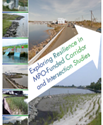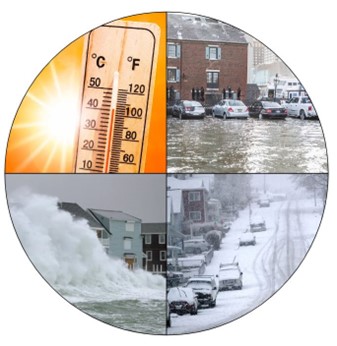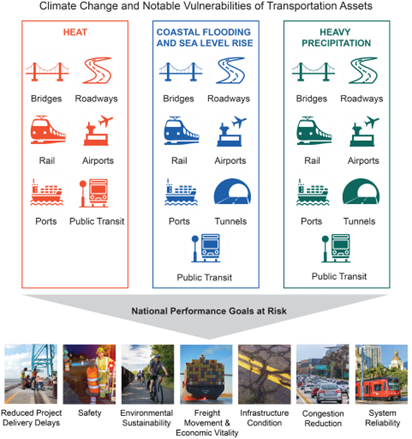“Investments in resilience can enable the region’s transportation system to anticipate extreme events, absorb their impacts, recover in a timely and efficient manner, and adapt to better withstand future disturbances caused by a changing climate.”
- Destination 2050
Climate change poses increasing risk to transportation assets and users from increased flooding, sea level rise, extreme temperatures, and other hazards. The Boston Region MPO’s resilience work was expanded into a Climate Resilience Program, established in 2021, with the goal of assessing vulnerability and coordinating resilience investments in transportation in the Boston region
Staff have created resources for planners and stakeholders in the region related to resilience-building, climate change, and vulnerability. These resources include
- a resilience-focused StoryMap developed for Destination 2050’s Needs Assessment, which contains analyses and recommendations for transportation resilience in the region;
 a study titled Exploring Resilience in MPO-funded Corridor and Intersection Studies, which provides a foundation for including resilience themes in the MPO’s transportation studies as well as a case study on climate vulnerability in Revere, Massachusetts;
a study titled Exploring Resilience in MPO-funded Corridor and Intersection Studies, which provides a foundation for including resilience themes in the MPO’s transportation studies as well as a case study on climate vulnerability in Revere, Massachusetts;
 the All-Hazards Planning Application, which provides an interactive platform for exploring climate and transportation-related data; and
the All-Hazards Planning Application, which provides an interactive platform for exploring climate and transportation-related data; and
- a StoryMap titled Climate Resilience Guidance for Planners, which provides municipal planners with strategies on how to incorporate resilience into their transportation projects and score points in the TIP’s new resilience goal area.
Climate Change in the Boston Region
According to the 2022 Massachusetts Climate Change Assessment and the 2018 State Hazard Mitigation and Climate Action Plan, the following are projections for the Commonwealth and the Boston region:
- Sea level rise
The relative mean sea level in Boston Harbor is expected to rise between 1.4 and 2.4 feet by 2050, which will increase the number of flooding events from high tides and storm surge.
- Heavy precipitation
Parts of the Boston Region may experience up to 12 percent more annual rainfall by 2070, while individual rainfall events will become more variable, severe, and punctuated by periods of drought.
- Extreme heat
Inland parts of Massachusetts may experience up to 25 days over 90°F annually by 2050, compared to just four days historically. Coastal parts of the state won’t experience as drastic a change in extreme heat days, although this might be offset by the urban heat island effect in the more developed parts of the Boston area.

(Image credits: Top left: NBC Los Angeles; Top right: Conservation Law Foundation;
Bottom left: Boston Herald; Bottom right: Boston Globe)
These climate hazards will impact all aspects of the transportation system, including rider safety, system reliability, and infrastructure condition. A coordinated effort among government agencies and other stakeholders will be needed to guide investments in resilience to reduce vulnerability to hazards.

(Image credits: Fourth National Climate Assessment, U.S. Global Change Research Program)
Climate Change and Notable Vulnerabilities of Transportation Assets
Six transportation assets,
- Bridges;
- Roadways;
- Rail;
- Airports;
- Ports; and
- Public Transit
are vulnerable to all three effects of climate change,
- Heat;
- Coastal flooding and sea level rise; and
- Heavy precipitation
while tunnels are additionally vulnerable to the last two effects. These vulnerabilities put the following National Performance Goals at risk:
- Reduced project delivery delays,
- Safety,
- Environmental sustainability,
- Freight movement and economic vitality,
- Infrastructure condition,
- Congestion reduction, and
- System reliability.
Ongoing and Future Work
- Updating resiliency criteria for project selection in the TIP, in collaboration with regional environmental advocacy groups and agencies
- Expanding vulnerability assessment work started for Destination 2050’s Needs Assessment to further our understanding of transportation vulnerability in the region
- Reviewing findings from Boston region municipalities’ climate plans to identify transportation needs
- Improving engagement and communication with regional environmental advocacy groups
Contact Us
Judy Day
Climate Resilience and Air Quality Program Manager
jday@ctps.org
